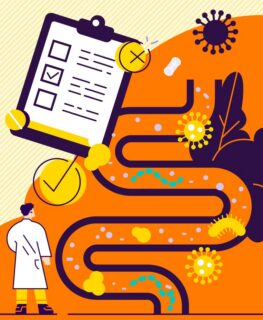In recent months, there’s been increasing talk about the potentially long-term effects of coronavirus, with lots of media headlines covering the phenomenon of ‘long Covid’ (or ‘post-acute Covid-19 syndrome’).
So what’s it all about?
Well, the truth is we don’t yet have thorough large-scale studies investigating the full impact of long Covid. Keep in mind these studies only look at 3-6 months post-infection, so the long-term results are still relatively unclear (read: take any drastic or scaremongering headlines with a pinch of salt!). In the meantime, here’s the latest insight into what we know so far.
Before we dive in, if you’ve been affected by COVID-19, just remember everyone’s recovery will be different. A lot of people feel better in just a few days or weeks, and at the moment it seems to be the case that most people generally see full recovery within a few months. It’s still early days, so speak to your healthcare team, give your body some love and time to recuperate – I have some tips for you below.
What is ‘long Covid?’
Long Covid is the term used to describe ongoing symptoms people have reported that can last for weeks or months after the Covid-19 infection has gone. After initial reports circulated mainly on social media, several scientific studies have now been published on the health effects of Covid-19, beyond the acute infection itself.
Some of the common long Covid symptoms reported include extreme tiredness, shortness of breath, brain fog (i.e. affected memory or concentration), trouble sleeping, feelings of anxiety, other common cold-like symptoms, as well as gut symptoms (diarrhoea, sickness, stomach pain, appetite loss) and changes to smell or taste.
New study in focus: 6-month consequences of Covid-19, Huang, et al., 2021
A new study published in a leading UK medical journal (The Lancet), interviewed over 1,700 people in China 6 months after being in hospital with Covid. They also carried out medical tests, including blood tests and physical examinations to check lung function.
They found that Covid-19 survivors were having trouble with fatigue, muscle weakness, difficulty sleeping, feelings of anxiety or depression:
- 76% of patients reported at least one ongoing symptom 6 months after first having Covid-19 – and this was more common in women than in men
- 63% of patients reported ongoing fatigue and muscle weakness
- 26% had difficulty sleeping and 23% had symptoms of anxiety or depression
- Those who were more severely unwell from Covid-19 infection had increased risk of depression and lung damage
Full disclosure: Before we take the study at face value (all studies have limitations!), there are a few things that it’s important to note:
- The study was focused on one region (China), so the differences between countries and their medical systems haven’t been covered
- There’s also a risk that people with symptoms could be more willing to participate in the study, so this could skew the results and overestimate the impact of long Covid (while those without ongoing symptoms didn’t take part). Remember this study included only people who had been admitted to hospital with Covid-19.
- Many Covid-19 patients were excluded from the study for various reasons, so the data may not be complete – again, potentially limiting the reliability of the findings
That said, it was quite a large study with a good follow-up period of 6 months, so the results shouldn’t be dismissed. It’s really important that we take this data to help focus on supporting people with the best care for ongoing recovery.
Further findings so far: study snippets
That being said, long Covid doesn’t just affect those who had a more severe infection or needed hospital treatment – nor is it just the elderly; it may affect younger people too.
Data from the Covid Symptom Study app, developed by some of my colleagues at King’s College London, shows that:
- 13% of people still have Covid symptoms after 28 days
- 4.5% of people still experience symptoms after 8 weeks
- Around 3% of people continue to be affected after 12 weeks
But again there are many limitations to this data, and it hasn’t yet been published in a peer-reviewed journal.
What causes ‘long Covid’?
The cause of long Covid isn’t yet fully understood and can be different from person to person, but it’s thought to be a combination of the lung damage done by the original infection, as well as ongoing disruption to the immune system and increased inflammation.
Feeling the effects of long Covid? Here’s what you can do
If you’re experiencing more severe symptoms of long Covid, it’s important to speak to your healthcare team. In the UK, the NHS has started to set up post-Covid clinics for this reason.
For others, there are simple things you can do yourself to help your energy levels, manage symptoms and support your recovery. It’s important to recognise the effect on our emotional and mental wellbeing too, by keeping in touch with friends and family (virtually) and getting outside for a walk where you can, socially distanced of course.
The road to recovery
Your own journey will be individual to you, depending on your symptoms, but it’s safe to say a nutritious, varied and balanced diet will be key for everyone to support your immune system.
That includes making sure your overall food intake is sufficient, including protein and key micronutrients which are known to play key roles in supporting our immunity and reducing risk of infection, such as vitamins A, B6, B12, folate, C, D and E and the trace elements zinc, copper, selenium and iron. So what does that actually look like in terms of food? Check out our Gut Health on a Plate pictorial below. If your food intake is limited, you may be recommended supplements by your healthcare team, but food first is the goal.

With fatigue being the number one symptom of long Covid, focus on getting good quality sleep, aiming to get those 7 to 9 hours of shut-eye every night. You can check in on your own sleep quality with my Sleep Assessment here.
Managing stress and anxiety is also important – that’s where some simple mindfulness techniques to help relieve stress can be a game-changer, such as meditation or yoga. More tips on reducing stress here and the sleep benefits of ditching your phone for at least 30 mins before bed here.
Long Covid & the gut
Studies show gut symptoms of long Covid, including taste changes, loss of appetite, diarrhoea and vomiting. Our gut health (including our gut microbes) is essential for our immune system (an impressive 70% of our immune cells live along our digestive tract) and is increasingly being recognised as playing an essential role in not only initial Covid-19 outcomes but managing long Covid too. Read more about the link here.
This includes recovery, so it’s worth giving thought to your microbes!
From research so far, we know our gut microbes can be significantly altered, with the composition of gut bacteria susceptible to changing post-Covid. And looking after those gut microbes is something everyone can do, with varied plant-based foods packed with fibre, alongside lifestyle strategies we’ve touched on for your mind and movement. If you’re just beginning, my 10-Step Guide is a good place to start.
If you’re experiencing changes in taste, low appetite or other gut disturbances like diarrhoea, try eating little and often, and limiting common triggers such as spicy food and large amounts of caffeine. If you notice unintended weight loss, it’s a good idea to speak to a dietitian. Depending on where you live you can ask your medical practitioner for a referral, or you can get in touch with us at The Gut Health Clinic where we can help with virtual appointments.














